R <<< Author: S >>> T
Jump to:
Hilary Sallick |
Catherine Sasanov |
Steven Schreiner |
Rene Schwiesow |
Adam Shechter |
Roger Sedarat |
Claudia Serea |
Zvi A. Sesling |
Constantin Severin |
Adam Shechter |
Glenn Sheldon |
Anis Shivani |
Larissa Shmailo |
Beate Sigriddaughter |
Marcus Silcock Slease |
Susannah Simpson |
Noel Sloboda |
Judith Skillman |
Paul Sohar |
Andrew Stancek |
John L. Stanizzi |
Michael Todd Steffen |
Tim Suermondt |
Vijaya Sundaram |
Roberta Swann
Hilary Sallick
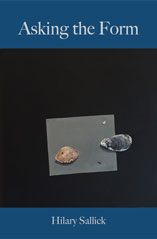 Asking the Form by Hilary Sallick
Asking the Form by Hilary Sallick
Červená Barva Press, 2020-
Poet and educator Hilary Sallick lives and works in Somerville, MA, where she and her husband raised their two children. She teaches reading and writing to adult learners and serves as vice-president of the New England Poetry Club. Her longtime interest in the potential of poetry to build community and to foster deep learning grounds all her work. Her chapbook, Winter Roses, was published in 2017. Asking the Form is her first full-length collection.
About Asking the Form
As its title suggests, the poems in Hilary Sallick's Asking the Form raise questions about and through form: If I place my trust in form, where will it take me and how can its meaning grow? What connections can I discover by asking the form? A milkweed pod, the human body, time itself are all subjects and forms under consideration, and the poems experiment with the sonnet, villanelle, pantoum, and other traditional forms as well. The collection ranges widely in theme, from children and relationships to art and nature; and in setting, from small interiors to large vistas, from New England to Texas. The voice that arises through these poems, at times intimate, at times cool, is distinct.
With a watercolorist's perception of how the eye sees and a musician's feel for the shape of sound, Hilary Sallick pulls the reader in close in Asking the Form. The poems unfold quietly, unerringly, through the accumulation of subtle observation and depth of insight. In "Watercolor at Long Pond," she writes that "The coming and going the here / and not here intertwine," and her ability to capture flux is an essential part of her gift. She trusts the reader to journey with her, to contemplate alongside her, and to explore with her the contours of the inner and outer, the irreplaceable moments of a life.
-Jennifer BarberI very much admire the beauty, depth and intensity of this collection, in which Hilary Sallick takes the materials of daily life and shapes them into profound meditations on life itself. The book's first poems consider the various containers that enclose us; a later group brings us painfully close to the experiences of a dying man. The title poem, a sonnet sequence, reflects on making art in the midst of one’s life, as Sallick continues to work on the sonnet, "this sieve, with water running through," while both grounded and interrupted by her small son's hands, "red with cold, shaped for impatient understanding." Asking the Form's authentic questioning is only equaled by the skill and grace of its poetry.
-Susan Donnelly author of The Path of ThunderHilary Sallick's Asking the Form is a wise and beautiful exploration of the poet's perennial question-where to begin? The poems are like little rooms of meditation where one ponders the pointillist nature of the creative impulse-the gathering, the listing, the organizing, the chronicling that must somehow be shaped into coherence and revelation. However, as I read the poems again, I began to understand that these are also the revelation! These are the paths leading to the poem! This is the wonderful work that Sallick performs in Asking the Form. The well-wrought organicism of these poems puts one in the mind of Aristotle's notion of entelechy: that there is something in an organism that knows what it must become-but at each point of its becoming it is surprised by what it is! And these poems are surprising, for they are of a writer being written-being shaped into being by her own need and urge and breath. The poems in Sallick's Asking the Form, are not just sculpted scripts for the page-they are also made for the ear and the mouth! Sallick's phrasings need to be heard aloud, and are a joy to speak. And so the reader, transformed as listener, finds another form of pleasure: music.
$18.00 | 978-1-950063-18-5 | 81 Pages
-Regie Gibson
Catherine Sasanov
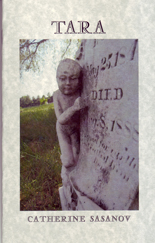 Tara by Catherine Sasanov
Tara by Catherine Sasanov
Červená Barva Press, 2008-
In 2005, poet Catherine Sasanov made an unsettling discovery: slaveholding had been an unspoken part of her family's history. Sasanov's painstaking search to find out what happened to the men, women, and children held by her ancestors is at the heart of her new chapbook, Tara. In its pages, Sasanov conjures Missouri's Antebellum landscape out of the ravages of urban sprawl. She pieces together a portrait of slaves and freedmen in poems haunted by the question: How does one write a coherent life of a people if only bits and scraps of their existence can be found?
Reviews: http://www.jendireiter.com/2015/06/09/chapbook-spotlight-poetry-from-catherine-sasanovs-tara/
$7.00 | 30 Pages | Out of Print
Steven Schreiner
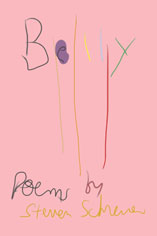 Belly by Steven Schreiner
Belly by Steven Schreiner
Červená Barva Press, 2015-
STEVEN SCHREINER is the author of the collection Too Soon to Leave and the chapbook Imposing Presence, and co-author with Allison Cundiff of In Short, a Memory of the Other on a Good Day. His poems have appeared in many magazines, including Poetry, Image, Colorado Review, River Styx and December, and numerous anthologies. He is the recipient of fellowships from the VCCA, Tall Rock Retreat, and The National Writer's Voice of the YMCA. He teaches in the MFA Program at the University of Missouri-St. Louis and is the founding editor of Natural Bridge, a journal of contemporary literature.
Cover art: Ethan Shaltout and Steven Schreiner
Belly is a sequence of confessions. It is a quiet yet intense journey into the deepest wells of a maturing heart. Schreiner writes movingly about the painful transience of love and loss, the forces of memory and childhood, delineated by the revision of seasons and the symbolism of flowers as death, as remembrance. Belly reconciles the permanence of family in all its anguish and grief with the consciousness and inevitability of what supremely makes us human: forgiveness.
—Rewa ZeinatiSteven Schreiner reaches his summit in this remarkably vivid, darkly truthful, and often heartbreaking book of memories, losses and longings, the work of experience.
$17.00 | ISBN: 978-0-9861111-8-1 | 80 Pages | In Stock
—Edward Hirsch
Rene Schwiesow
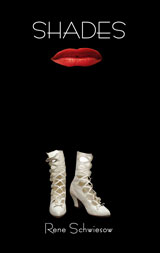 SHADES by Rene Schwiesow
SHADES by Rene Schwiesow
Červená Barva Press, 2017-
Rene Schwiesow came to the Boston Poetry Scene through drumming. In a fortuitous alignment of the planets and stars she met the late, great Mike Amado at a drum circle and the rest is history. She is currently a co-host for the popular South Shore poetry venue, The Art of Words, where she not only reads poetry and introduces features and open mike readers, but also is maker of the meatballs served during intermission (recipe is strictly a secret, unless you ask her nicely). Rene has been published in various publications including Muddy River Poetry Review, City Lights, Ibbettson Street Press, The Aurorean, and Bagel Bard and Tidepool Poet Anthologies. When she is not writing, reading, or watching Doctor Who, she can be found with a Tarot deck, aligning chakras with Reiki, or shopping for boots in support of her obvious shoe fetish.
In this collection of heart echoes, the words reverberate moments strung along the poet's timeline. The poetry is a showcase of laughter, heartache, growth, letting go, recognition, awareness, friendship, and love. Schwiesow has used keyboard as paintbrush to create page after page of moving images. May you find your own echoes whispering in the gap between each word, phrase, and poem that imprints itself upon your mind.
$17.00 | ISBN: 978-0-9984253-0-6 | 77 Pages
Adam Shechter
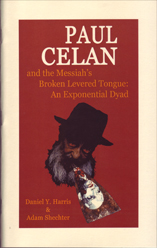 Paul Celan and the Messiah's Broken Levered Tongue: An Exponential Dyad
Paul Celan and the Messiah's Broken Levered Tongue: An Exponential Dyad
by Daniel Y. Harris and Adam Shechter
Červená Barva Press, 2010-
As Ron Sukenick so aptly put it in his last book "Mosaic Man," Jews are both proto and posthuman. Adam Shechter and Daniel Y. Harris are possessed of that molten globe of fiery perdition that draws the brighter children of the tribe to the flame. Add poetry and oy! What can I say? Shechter and Harris have made another journey to the hellchamber of Jewish mystery/creation/death and came out in company, a big company that includes a lot of fried geniuses, but most of all they came out, and it's good to see them.
—Andrei Codrescu (www.codrescu.com), is the author of The Posthuman Dada Guide: Tzara and Lenin Play Chess (Princeton University Press) and edits Exquisite Corpse at (www. corpse.org).I can't begin to comprehend/surround all that is transpiring here in this Harris/Shechter collaboration/fusion—I'll need other readings toward adequate bearings—but as Seine suicide Paul Celan hovers among these pages of prayerful heresies—"no Shabbos-always Shabbos"—I experience a language that wields "pen as scalpel," and I feel flayed but grateful for this awakening into wild inquiry/attack. By way of thousands of years of Jewish history & of their own lives slashed out in poems & prose pieces of mesmerizing power, even as they wonder if they've gone too far, these two visionaries/revisionists have made something powerful & new here, something of charismatic complication. Oi Vey, & mazel tov.
—William Heyen, author of Shoah Train: Poems, finalist for the National Book Award
Adam Shechter is from Un-Brooklyn, the imperceptible imperialist brownstone aesthetic of 1989 Prospect Park West benches by Garfield Street. Adam has never been published in The New Yorker and The Paris Review and this fact is likely to never change. For this reason, he started the online journal, The Blue Jew Yorker. Sadly, this quaintly anarchistic periodical has not found its reputation competitive with the above named titans of publishing. Still, Mr. Shechter receives great emotional satisfaction in publishing authors and artists in the journal. A tragic and ironic fact of Adam's life is that his neighborhood of birth and raising, Park Slope, now houses some of the most successful authors of the writing world. Roger Cohen moved in next to his parents, a house where the fabled Christiansen family once lived. In line with Freud, listening to the same song over and over is one of Adam's favorite hobbies.
Daniel Y. Harris, M.Div, holds a Master of Arts in Divinity from The University of Chicago, where he specialized in Jewish theology and comparative religion and wrote his dissertation on The Zohar. He is the author of Unio Mystica (Cross-Cultural Communications Press, 2009) and Hyperlinks of Anxiety (forthcoming from Cervena Barva Press, 2012). He is the associate editor of The Blue Jew Yorker. He is a three-time Pushcart Prize nominee. Among his credits are: The Pedestal Magazine, Exquisite Corpse, In Posse Review, European Judaism, SoMa Literary Review, Mad Hatters' Review, Poetry Salzburg Review, Wheelhouse Magazine, Moria, Ygdrasil, Wilderness House Literary Review, Poetry Magazine.com, Denver Quarterly, Convergence, Zeek: A Jewish Journal of Thought and Culture and The Other Voices International Among his art exhibitions credits are: The Jewish Community Library of San Francisco, Market Street Gallery, The Euphrat Museum and The Center for Visual Arts. His website is www.danielyharris.com.
Big Bridge, Jake Marmer’s review:
http://www.bigbridge.org/BB15/toc.html
Click here for PDF VersionReview in The Pedestal:
http://www.thepedestalmagazine.com/gallery.php?item=16628Review in The Jewish Forward by Jake Marmer: http://blogs.forward.com/the-arty-semite/132899/
Paul Celan and the Messiah’s Broken Levered Tongue was picked as one of the 5 most important poetry books of 2010 by The Jewish Daily Forward. http://blogs.forward.com/the-arty-semite/134268/
$7.00 | 58 PagesOut of Stock
Roger Sedarat
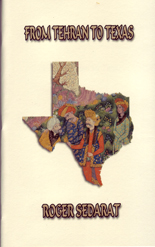 From Tehran To Texas by Roger Sedarat
From Tehran To Texas by Roger Sedarat
Červená Barva Press, 2008-
Roger Sedarat's poetry collection, Dear Regime: Letters to the Islamic Republic, won Ohio University Press's Hollis Summers Award. His poems have also appeared in such journals as New England Review, Poet Lore, and Iranian.com. He is the recipient of scholarships to the Bread Loaf Writers' Conference as well as a St. Botolph Society poetry grant. He teaches poetry and translation in the MFA program at Queens College, City University of New York.
$7.00 | 38 Pages | In Stock
Claudia Serea
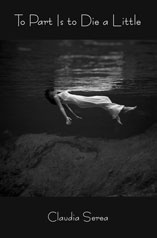 To Part Is to Die a Little by Claudia Serea
To Part Is to Die a Little by Claudia Serea
Červená Barva Press, 2015-
Claudia Serea is a Romanian-born poet who immigrated to the U.S. in 1995. Her poems and translations have appeared in Field, New Letters, 5 a.m., Meridian, Word Riot, Apple Valley Review, The Red Wheelbarrow, and many others. A four-time Pushcart Prize and Best of the Net nominee, she is the author of three other full-length collections: Angels & Beasts (Phoenicia Publishing, Canada, 2012), A Dirt Road Hangs From the Sky (8th House Publishing, Canada, 2013), and Nothing Important Happened Today (Broadstone Books, forthcoming, 2016). Her poem My Father’s Quiet Friends in Prison, 1958-1962 received the New Letters Readers Award in 2013. Serea co-hosts The Williams Readings poetry series in Rutherford, NJ, and she is the founding editor of the National Translation Month. More at cserea.tumblr.com.
Serea's poems instantiate with startling clarity and empathy what it means to be at once deeply rooted in the world and permanently dislocated, a cultural curator and translator, a juggler of conflicting desires. Her pendulum-like sway between her homeland, Romania, and the adopted/adoptive one, America, creates a fluid space of in-betweenness that allows her transnational speakers to choose not to choose, and to articulate, instead, what it means to live attuned to the distinct textures of these two worlds' beauty and grit, to their flute songs and "half-lit solitude[s]." Her incisive eye gives us the "Plexiglass politeness" of America alongside the de-humanizing deprivations of life in (post-) communist Romania, the guarded emotions of New World suburbia alongside the odyssean waiting that has become her parents' life in the village house with a "wasps' nest in its bosom" and chickens ready "to scratch the road for coins and worms."
To Part Is to Die a Little is a spare yet rapturous chant about an unending emigration and the continuous return to the soul of one culture in the language of another.
—Mihaela Moscaliuc, author of Father Dirt (Alice James Books, 2010)Readers of To Part Is to Die a Little should prepare for an emotional journey, as they witness dramatic changes in the speaker's character and her surroundings. Deeply moving poems chronicle poignant milestones spanning from the speaker’s decision to leave her country of birth to settling into her country of choice, adopting her new life and seemingly making peace with an inherent duality voiced as "Let me be the pendulum/between my two lives." We meet and sympathize with poignant and vivid characters such as a Thai busboy, a Russian grocery bagger, Danny-the-butcher and other "Stars of the Underground." Congratulations to Claudia Serea for a well-crafted and brilliantly structured book!
$17.00 | ISBN: 978-0-9861111-5-0 | 96 Pages | In Stock
—Katerina Stoykova-Klemer, author of The Porcupine of Mind
Zvi A. Sesling
New Release: Secret Behind the Gate by Zvi A. Sesling (Fiction)
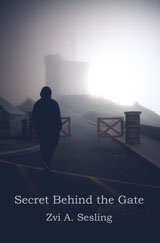 Secret Behind the Gate by Zvi A. Sesling
Secret Behind the Gate by Zvi A. Sesling
Červená Barva Press, 2023-
Zvi A. Sesling, Poet Laureate Emeritus of Brookline, MA (2017-2020) has published flash fiction and poetry in numerous magazines both in print and online in the United States, Great Britain, Ireland, France, Cyprus, New Zealand, Australia, India, Canada and Israel. He was awarded First Prize in the Reuben Rose International Poetry Competition. He was selected to read his poetry at New England/Pen "Discovery" by the late Boston Poet Laureate Sam Cornish. His poetry was selected for the Spring Rain Poetry Festival on Cyprus and his Hay (na) ku poetry is part of a display at the San Francisco Library. In addition, he has a Hay (na) ku, two poems and four flash fiction stories in Stanford University's Life in Quarantine project. Sesling was twice a featured reader in the Jewish Poetry Festival in Brookline, MA and is a regular reviewer for the Boston Small Press and Poetry Scene. Sesling is Editor of 10By10 Flash Fiction Stories and Muddy River Poetry Review. He has been a featured reader in various venues in the Boston area, San Diego, the Massachusetts Poetry Festival and the Boston National Poetry Festival. He has also read on local radio and cable television programs. He is author of four books of poetry, War Zones, The Lynching of Leo Frank, Fire Tongue and King of the Jungle and and three chapbooks, Simple Game, Baseball Poetry; Love Poems from Hell and Across Stones of Bad Dreams. He is the author of the recently published flash fiction chapbook Wheels. Sesling taught at Suffolk University, Emerson College and Boston University. He lives in Brookline, MA with his wife Susan J. Dechter.
Read Zvi Sesling's musings in Secret Behind the Gate and you’ll be instantly transported into zany, oftentimes ironic, journeys traversing the narrow alleyways, backroads, and main streets of Zvi's vivid imagination. His delightful nuggets are easily digestible but, oh so hard to put down!
-Phil Temples, author of The Allston Variant and Uncontacted FrontierIt takes an exceptionally rich imagination to conceive over two hundred truly distinctive pieces of short fiction. While microscopic in length, Zvi Sesling's tales are macroscopic in their ability to entertain and provoke. You laugh, you cry, and you think... really think--no small achievement in such attenuated works. I had several favorites in Secret Behind the Gate, foremost among them, "Nowhere Man," "The Bride Wears Black," and "What We Can Hope For." Indeed, these made me chuckle, tear up, and ultimately ponder the meaning of their message. They all had something of value to convey--maybe none more so than the book’s namesake. It's no secret that Zvi is an original raconteur of the highest order, a storyteller par excellence, possessing enormous wit and empathy.
-Michael C. Keith, author Insomnia 11 and Stories in the Key of MeWhen reading Zvi Sesling's Secret Behind the Gate, which I highly recommend, don't just cram a bunch of its tasty morsels into your mouth at once. They must be individually chewed, savored, and digested to be completely appreciated. They range from short fiction to flash fiction to micro fiction to something dangerously close to poetry, from profoundly funny to ironic to wistful to deeply sad, so you'll never know what's coming next.
$19.95 | ISBN: 978-1-950063-68-0 | 223 Pages
-Rob Dinsmoor, author of Toxic Cookout
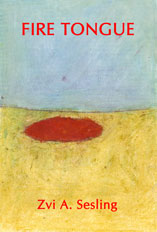 Fire Tongue by Zvi A. Sesling
Fire Tongue by Zvi A. Sesling
Červená Barva Press, 2016-
Zvi A. Sesling has published poetry in numerous magazines both in print and online in the United States, Great Britain, Ireland France, New Zealand, India, Canada, Australia and Israel. Among the publications are: Midstream, Voices Israel, Saranac Review, New Delta Review, Plainsong, Asphodel, Ibbetson St., Blue Lyre, Door Is Ajar, Scapegoat, The Chaffin Journal, Ship of Fools, Levure Litteraire, The Moth, First Literary Review—East, and Main Street Rag. He was awarded First Prize (2007) in the Reuben Rose International Poetry Competition. In 2008 he was selected to read his poetry at New England/Pen “Discovery” by Boston Poet Laureate Sam Cornish. He was a featured reader in the Jewish Poetry Festival in Brookline, MA. He is a regular reviewer for the Boston Small Press and Poetry Scene and is Editor of the Muddy River Poetry Review and publisher of Muddy River Books. Sesling has been a featured reader in various venues in the Boston area, San Diego, the Massachusetts Poetry Festival and the Boston Poetry Festival. Sesling has also read on local radio and cable television programs. He is author of King of the Jungle, (Ibbetson St., 2010), and a chapbook Across Stones of Bad Dreams (Červená Barva Press, 2011). He has taught at Suffolk University, Emerson College and Boston University. He lives in Chestnut Hill, MA with his wife Susan J. Dechter.
In Fire Tongue, the poems are precise and unsparing as they probe old questions of how and why the unspeakable enters our lives. In terse, suspenseful language and lines that are as light as their subjects they carry are heavy, indeed ominous, Sesling looks for hope, for what can redeem us. The poet finds the answer in our ability to listen, to feel, to own a conscience, and to value life.
-Afaa Michael WeaverPoet Zvi Sesling is at a point in life where there is much more in his past than in his future. In "Fire Tongue" there is delicate balance of the past, present and speculation of what is to come. Sesling fearlessly faces what we all feel deep in our marrow - our own mortality. As a highly skilled poet with a gimlet eye, Sesling pulls this off with a mixture of humor and pathos. No word is wasted... life is too short for that... Sesling ,my friends, is well acquainted with the night.
-Doug Holder, Ibbetson Street Press, Adjunct Professor of Creative Writing/Endicott CollegeFire Tongue takes us on a journey down Zvi Sesling's "road of sorrows." Here is madness, pain, cities of the dead, remnants of the lost, vast fields of suffering, outcroppings of cruelty, deserts of war and violence. With a dream-like clarity and precision reminiscent of Hieronymus Bosch, Sesling shows us what we cannot deny about our nature, our history, our times. This is poetry as ritual incantation, a fiery tongue in its own right, teaching us how to navigate and thus perhaps begin to understand our harsh and bloody terrain.
$17.00 | ISBN: 978-0-9966894-4-1 | 87 Pages | In Stock
-Fred Marchant, Author of The Looking House (Graywolf Press)
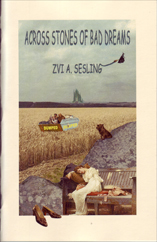 Across Stones Of Bad Dreams
Across Stones Of Bad Dreams
Poems by Zvi A. Sesling
Červená Barva Press, 2010-
Zvi A. Sesling has published poems in Midstream, Saranac Review, New Delta Review, Voices Israel Anthology, Cyclamens & Swords, Ship of Fools, The Chaffin Journal, Poetica, Ibbetson Street, Istanbul Literary Review, Illya's Honey, Wavelength, Asphodel, Main Channel Voices and Hazmat Review, and many others. In 2004 he was awarded Third Place in the Reuben Rose International Poetry Competition and in 2007 he received First Prize in the Reuben Rose International Poetry Competition. He was selected to read his poetry at New England/Pen "Discovery" in 2008 by Boston Poet Laureate Sam Cornish. He is editor of the Muddy River Poetry Review.
January 17, 2010
Review: Boston Area Small Press and Poetry Scene
http://dougholder.blogspot.com/This great chapbook is about the giant dumpster of memory in the realm of past loves gone dead. The image of death carries right into the end, where Sesling imagines heaven as a welcoming place with a beautiful aquamarine sky like his mother’s ring…and yet there are his mother and father and relatives still instilling guilt and criticism and where “Piles of ancestors like old newspapers in the basement/will present themselves as headlines for me to acknowledge,…the sun yellow as the stars my aunts, uncles, cousins wore.” Only “Dogs from my past will bound forward through green fields,/tails wagging a quick metronome to their happy bark…” Continued...
$7.00 | 38 Pages | In Stock
Constantin Severin
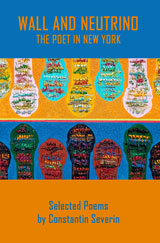 WALL AND NEUTRINO THE POET IN NEW YORK Selected Poems by Constantin Severin
WALL AND NEUTRINO THE POET IN NEW YORK Selected Poems by Constantin Severin
Červená Barva Press, 2021-
Constantin Severin is a Romanian writer and visual artist, founder and proponent of Archetypal Expressionism, a highly regarded global art movement, which he founded in Bukovina, in 2001, as well as co-founder of 3rd Paradigm International Artists Group. A graduate of the International Writing Program at the University of Iowa, he has published ten books of poetry, essays and fiction. One of his poems was included in the 2014 World Literature Today anthology, After the Wall Fell: Dispatches from Central Europe (1989–2014), aimed at popularizing post-Wende Central European literature on the twenty-fifth anniversary of the fall of the Berlin Wall. Severin's conceptual art and artworks have appeared in Artdaily, World Literature Today, It's Liquid, Levure littéraire, Empireuma, Contemporanul, Vatra, Arkitera, Glare Magazine, Cuadernos del Ateneo, Dance, Media Japan, and other international art and literary magazines.
Cover: art by Constantin Severin
Website: http://constantinseverin.ro/
All of Constantin Severin's work which I've seen proceeds from a single steady universal pulse - his poetry and fiction, his editing, his artwork and his organizing. It's as if he'd simply alighted and settled somewhere slightly above and askew from this world, colonized that spot, and begun processing reality and producing art in this sublime frame ever since - like an own industry; like a small steady sun. In its steady universality, grounded in a strong particular European lineage, Constantin has managed to produce a body of work - and chiefly I am speaking of his poetry here, although it may also be true of his painting - which is somehow also unmarked, by which I mean both that it is unsullied, and also without jagged edges on which to snag. It is often the jagged edges by which one becomes acquainted with work of sometimes lesser or flashier poets. Thus, it becomes somehow easy to overlook Constantin's body of work, in our crush of days - to miss its significant achievement. I believe history will be kind to Constantin Severin in this regard. His work is like a beautiful species of animal or plant which exists regardless of our noticing. It is a natural fount of clear coherent poetic output simply flowing, unselfishly and whole. His is a tree of ripened aesthetic fruit, ready to nourish us unstintingly in delight and recognition - if only we happen upon it. Here it is.
$18.00 | ISBN: 978-1-950063-44-4 | 94 Pages
Andrew Singer
Trafika Europe
Glenn Sheldon
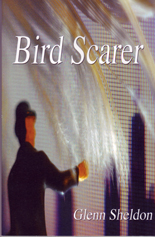 Bird Scarer by Glenn Sheldon
Bird Scarer by Glenn Sheldon
Červená Barva Press, 2008-
MARTHA COLLINS-Structurally and emotionally expansive, Bird Scarer covers more territory than most first books. Beginning as a displaced Bostonian who finds himself in Chicago, where a "terrible blankness fills my eye," Sheldon next moves into a more abstract landscape, where he finds a "permanent address" that is both actual and mental. Finally, he opens his emotional eye to the variety and vibrancy of Latin America, where his travels become the metaphorical basis for a "Geography of Desire." Though often playful, the book is carefully observant and edgily serious: "I'm alert," the poet says, "like a bus rider / with a drunk driver making up / the names of the streets." Metaphors like this, usually emerging from setting, as well as less easily defined conceits ("The anarchists' picnic is / a disaster: Where? Why? When?"), turn these well-grounded poems into delightfully non-linear narratives that keep the reader as alert as the poet.
SUSAN AZAR PORTERFIELD-I am impressed by Sheldon's form. Always the stanza, always very regular, tercets or quatrains, etc., which seems to suggest a kind of control as does his use of short lines as well as short sentences. It suggests a kind of control and even terseness, but what I like is his unexpected bloom or rush of thought and/or feeling that really comes through. In other words, he gets us to ride on this seemingly tidy little train, but then the journey takes us on a wilder ride than we anticipated. I like the surprise of that. I also like what I perceive to be his tone and voice. Quiet, a bit sardonic, but also heavily emotional, Bird Scarer is lovely.
JIM DANIELS-Bird Scarer is an impressive collection of poems. The voice is wise and mature. The structure of the book both clear and sophisticated. One of the things I look for in a book of poetry is an accumulation of momentum from beginning to end, and I found that here. The book creates interesting tensions in terms of place-the links between physical places and emotional landscapes are explored in all their complexities. Sheldon has a fresh voice-quirky and disarming, frank and witty. And always precise. I was struck by the consistent use of tight, packed language, and his careful use of the poetic line. I love the understated humor in many of the poems, and how he uses form to reinforce that humor. The depth and tonal richness of the comparisons seem effortless and natural, yet carry enormous weight in these poems. They roll through these poems, one after another, creating surprise, discovery, insight, throughout. And fun.
LUIS URREA-Glen Sheldon's earlier poetry is certainly filled with promise. We find a full voice in play. Perhaps the poems are shaded by his expertise in Thomas McGrath. Still, this influence does not in any way dull the poems' brio. It is as an American poet that Glenn Sheldon will ultimately be remembered (and revered). He will have a major career as a poet, as Bird Scarer reveals his full maturity and trajectory.
$14.00 | ISBN: 9780615171678 | 60 Pages | In Stock: 20
Anis Shivani
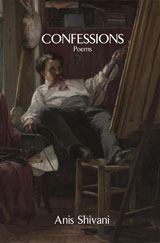 CONFESSIONS poems by Anis Shivani
CONFESSIONS poems by Anis Shivani
Červená Barva Press, 2022-
Anis Shivani is a poet, fiction writer, and literary critic living in Houston, Texas. His critically acclaimed books include Anatolia and Other Stories, The Fifth Lash and Other Stories, Karachi Raj: A Novel, My Tranquil War and Other Poems, Whatever Speaks on Behalf of Hashish: Poems, The Moon Blooms in Occupied Hours: Poems, Soraya: Sonnets, Against the Workshop: Provocations, Polemics, Controversies, and Literary Writing in the Twenty-First Century: Conversations. His work appears widely in such journals as the Yale Review, Georgia Review, Southwest Review, Boston Review, Threepenny Review, Michigan Quarterly Review, Antioch Review, Black Warrior Review, Western Humanities Review, Boulevard, Pleiades, AGNI, Fence, Denver Quarterly, The Journal, Gulf Coast, Third Coast, Volt, Subtropics, New Letters, Times Literary Supplement, London Magazine, Cambridge Quarterly, Meanjin, Fiddlehead, Dalhousie Review, Antigonish Review, and elsewhere. He has also written for many magazines and newspapers including Salon, Daily Beast, AlterNet, CommonDreams, Truthout, Huffington Post, Texas Observer, In These Times, Boston Globe, San Francisco Chronicle, Kansas City Star, Pittsburgh Post-Gazette, St. Petersburg Times, Baltimore Sun, Charlotte Observer, Austin American-Statesman, and elsewhere. He is the winner of a Pushcart Prize, and a graduate of Harvard College.
"Defiant, deft, bound to the imagination and the practice of the poet's craft, Anis Shivani's Confessions has given us much to appreciate. This startling work resists the easy spectacle poetry, and even confessions themselves, often offer the heart. Instead, Shivani's lucid perceptions expose, darkly, and incandescently, too, the aches and auguries of that which is spoken and unspoken through language. These inseparable collisions of ecstatic and ordinary life, the world and the word, intellect and instinct, are visceral in discovery and intimacy. We, too, become fortunate travelers hurtling inside the prowess of Shivani's polyphonic acts. Confessions is the voice of an expansive mind, deeply conscious and deservedly celebratory of its own free textures and countries."
-Rachel Eliza Griffiths, award-winning author of Mule & Pear, Lighting the Shadow, and Seeing the BodyPRAISE FOR ANIS SHIVANI'S POETRY
"Anis Shivani evidently inhabits a world in which every moment of time in the past, present, and a humorously but lethally prophesied future, occurs simultaneously and is animated by a wit sometimes subtle, sometimes savagely indignant. Its two faces join forces and somehow manage to speak in unison of what they actually see and think. I sense everywhere an undercurrent of compassion and identification, a poignant humanity and sense of responsibility underneath his torrential voice."
-Franz Wright"When I first plunged into Anis Shivani's work, I had the impression two of my most admired dead poet friends were one-upping each other in the afterlife-Tom Disch with his straight-faced drop-dead virtuoso satire of literary and political pretension and Aga Shahid Ali with his eloquent, global, polyglot formal legerdemain-both of them knowing more about history and about literature than ninety-nine percent of their readers. But Shivani's poems are no phantoms, they are vibrant, new, knowledgeable, daring, and welcome."
-Marilyn Hacker"Anis Shivani's poetry is remarkable for its continuing preoccupation with literature, culture, and language, and a discourse that incorporates the written word, the oral tradition, and the imagery of art and film. His cerebral poems often border on the obscure, but constantly challenge the reader to unravel deeply embedded references, suggestions, and innuendoes. The innovative use of words and sounds that draw on myriad languages and cultures adds to the rich texture of each poem."
$18.00 | ISBN: 978-1-950063-29-1 | 102 Pages
-Muneeza Shamsie
Larissa Shmailo
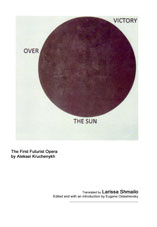 Victory over the Sun The First Futurist Opera
Victory over the Sun The First Futurist Opera
by Aleksei Kruchenykh
Translated by Larissa Shmailo, Edited and with an introduction by Eugene Ostashevsky
Červená Barva Press, 2014-
Victory over the Sun, one of the most important events in Russian Futurism and in the avant-garde in general, is not well recognized in the West. Now in a new edition of Larissa Shmailo's brilliant translation of the text, with a lively introduction by Eugene Ostashevsky, readers can appreciate the significance and innovativeness of the 1913 play. Using Shmailo's translation and Malevich's pathbreaking stage designs, the play was reconstructed and staged in 1980 to great acclaim and remains a signal accomplishment in the history of the avant-garde.
—Gerald Janecek, Author of Zaum: The Transrational Poetry of Russian Futurism (UCSD, 1996) and Sight and Sound Entwined (Berghahn Books, 2000)Velimir Khlebnikov, literally, missed the train on co-penning this one, contributing only a poem to Kruchenykh's libretto. Staged alongside Mayakovsky's Vladimir Mayakovsky, A Tragedy, the 1913 original production of Victory is remembered primarily for Kazimir Malevich's costumes, lighting, and set design, instigations for the Suprematism and Constructivism still to come in 1915 and 1919, respectively…. Nothing is more fitting for this centennial of "Russian Futurianism" than a celebration of Kruchenykh's great contribution to poetry, his Zaum, and not just for its verbal play – the inventive neologizing and the épater-le-bourgeois utopianism – but for the underappreciated antilyricism of his verse, as well. In communicating to us his musicality in English, Larissa Shmailo has done a remarkable job in conferring on Kruchenykh his true due as a poet.
-Alex Cigale, Translations Editor of MadHat LitA century ago, Aleksei Kruchenykh was the way out writer's most way out writer. If publishing today, he still would be.
-Richard Kostelanetz, Author of A Dictionary of the Avant-Gardes (Routledge, 1993)Rain Taxi review:
http://www.raintaxi.com/victory-over-the-sun-the-first-futurist-opera/Featured in Russia Beyond the Headlines: http://rbth.com/literature/2015/01/21/the_enduring_appeal_of_russias_avant-garde_43039.html
$16.00 | ISBN: 978-0-692-30231-6 | 56 Pages | Out of Stock
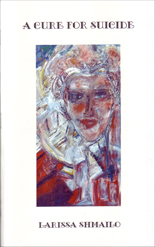 A Cure For Suicide by Larissa Shmailo
A Cure For Suicide by Larissa Shmailo
Červená Barva Press, 2008-
In "A Cure for Suicide” by Larissa Shmailo, Shmailo writes (as the founder of Fulcrum Magazine Philip Nikolayev points out in his introduction) as if she is …” constitutionally predestined to sing out her lines…her eyes filled with life and love, pain and death, freedom and coercion, the real of the mind and the imagined of the heart.” In the poem “Dancing with the Devil,” the poet sings about the need to throw caution to the wind and trip the light fantastic with the Devil:
“They say if you flirt with death,
you’re going to get a date;
But I don’t mind—the music’s fine,
And I love dancing with someone who can really lead.”Shmailo put herself in the deceptive calmness of the eye of a hurricane, asks us to tell her what makes us tic, and takes us on the Harlem River Line, like the “Duke” took us on the “A” train. In a sea of mimics this poet is an original voice.
~Doug Holder/ Ibbetson Update/ May 2008
Mark Lamoureux on four Červená Barva Press Chapbooks,
$7.00 | 47 Pages | In Stock: 20
Gently Read Literature Review:
http://gentlyread.wordpress.com/2009/06/01/mark-lamoureux-on-four-cervena-barva-press-chapbooks/
Beate Sigriddaughter
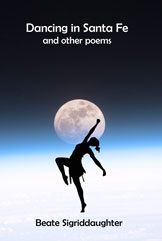 Dancing in Santa Fe and other poems by Beate Sigriddaughter
Dancing in Santa Fe and other poems by Beate Sigriddaughter
Červená Barva Press, 2019-
Beate Sigriddaughter, www.sigriddaughter.net, was poet laureate of Silver City, NM (Land of Enchantment) from 2017-2019. She grew up in Nürnberg, Germany, where she began her trajectory of enchantment a five-minute walk from the castle. Alternate playgrounds, even closer to home, were World War II bomb ruins. Contrasts in her life became the norm. Her writing has received multiple Pushcart Prize nominations and a handful of poetry prizes. Keenly interested in women and their situation in the world, she created the blog Writing In A Woman's Voice where she publishes other women's work.
This life a sacred loan./ I vow to celebrate" the poet proclaims in this exquisite chapbook. These are powerful poems of loss and transcendence. Sigriddaughter's singular brilliance lies in making the cosmic fiercely personal; she shines a light.
-Alexis Rhone Fancher, poetry editor, Cultural Weekly, author of Junkie WifeSkillfully balanced between facing the ominous facts in world news and her enthusiasm for the spirit and beauty in her surroundings, Beate Sigriddaughter’s short collection is filled with clear-sightedness. The title poem brilliantly juxtaposes an inherited German history with her current New Mexico situation filled with affection and natural wonders. These pages are for all who seek something both uplifting and realistic; a lyrical wisdom that acknowledges a debt to fairy tales spanning light and darkness.
-David Chorlton, author of Reading T. S. Eliot to a BirdRadiant writing! Beate Sigriddaughter is unafraid of the dark, and so is able to illuminate with rapturous language the hidden perplexities of the heart. Her vision is clear, her observations cut to the core with insights into nature and human nature seen through a focused lens of hard-earned joy. I found these poems astoundingly moving!
-Eve West Bessier, Poet Laureate of Silver City, NMBeate Sigriddaughter's Dancing in Santa Fe and other poems will make you remember what it is to be alive in this world. Insightful, rewarding poetry. These poems moved me. They are filled with heart and care and apology and exquisite writing. They explore the darkness as well as the awesome beauty of life, and how, as human beings with a soul and memory, we must learn to live with both. These poems question and consider, looking inward as well as to the physical world, and to the mystical and spiritual. Ultimately, they lift a dark curtain, and are laced with love.
-Kari Nguyen, Contributing author, The Best of Boston Literary Magazine (Volume One) and New Hampshire's Emerging Writers Anthology (2018)Were I forced at the point of King Arthur's sword to sum up Beate Sigriddaughter's poetic voice in three words-not counting the audible gulp at such a daunting demand-my response would be a strong, defiant, "Redolent of Life!" (The exclamation point my proud, subversive fourth.)
$8.00 | ISBN: 978-1-950063-23-9 | 34 Pages
-Mathew Paust, author of Executive Pink, whose blog Crime Time is at https://mdpaust.blogspot.com
Marcus Silcock Slease
 I REALLY LIKE LOVERS OF POETRY by Grzegorz Wróblewski
I REALLY LIKE LOVERS OF POETRY by Grzegorz Wróblewski
Translated from the Polish by Grzegorz Wróblewski & Marcus Silcock Slease
Červená Barva Press, 2024-
Grzegorz Wróblewski was born in 1962 in Gdansk and grew up in Warsaw. Since 1985 he has been living in Copenhagen. English translations of his work are available in Our Flying Objects (trans. Joel Leonard Katz, Rod Mengham, Malcolm Sinclair, Adam Zdrodowski, Equipage, 2007), A Marzipan Factory (trans. Adam Zdrodowski, Otoliths, 2010), Kopenhaga (trans. Piotr Gwiazda, Zephyr Press, 2013), Let's Go Back to the Mainland (trans. Agnieszka Pokojska, Červená Barva Press, 2014), Zero Visibility (trans. Piotr Gwiazda, Phoneme Media, 2017), Dear Beloved Humans (trans. Piotr Gwiazda, Lavender/Dialogos Books, 2023) Asemic writing book Shanty Town (Post-Asemic Press, 2022).
Marcus Silcock Slease is a (mostly) surreal-absurd writer from Portadown, N. Ireland. He is the author of Puppy (Beir Bua Press), Never Mind the Beasts (Dostoyevsky Wannabe), The Green Monk (Boiler House Press), and Play Yr Kardz Right (Dostoyevsky Wannabe), among others. His poetry has been translated into Polish and Danish and has appeared or is forthcoming in various magazines and anthologies, including: Tin House, Poetry, The Lincoln Review, Bath Magg, New World Writing, Tupelo Quarterly, and in the Best British Poetry series. He lives in Sitges, Spain. Find out more at: Never Mind the Beasts (www.nevermindthebeasts.com)
"I REALLY LIKE LOVERS OF POETRY" is the latest book of poetry by Grzegorz Wróblewski. The English versions of the poems are the author's work in collaboration with Marcus Silcock Slease. The author was born in Poland in 1962 and has lived in Copenhagen, Denmark, since 1985. Grzegorz Wróblewski is translated into many languages. The current book raises existential issues concerning the paradoxes of human functioning, loneliness and human isolation. The poetic works in this book are often minimalistic, devoid of the metaphorical structure typical of European lyric poetry. They may sometimes be associated with Zen poetry. The poems from the volume "I REALLY LIKE LOVERS OF POETRY" are also a criticism of the modern world full of consumerism. They try to draw the reader's attention to issues that are lost in a world full of ruthless materialism.
Polish writer and visual artist Grzegorz Wróblewski has written I Really Like Lovers of Poetry directly in English with assistance of his friend and fellow writer Marcus Slease. A translation, a collaboration, certainly an experiment, it is above all a collection of mordant parables about humans — and occasionally nonhumans too. A moralist at heart, like Bertolt Brecht, Wróblewski demystifies and clarifies: "Everyone is looking for the truth. / The only truth is the rumbling / of our stomachs."
—Piotr Gwiazda, translator of Dear Beloved Humans: Selected Poems by Grzegorz WróblewskiIn his latest book of poems, Grzegorz Wróblewski delivers what readers have always loved him for: his take on not just the personal, but the condition of human beings and all creatures (I would like to wake up someday/among people who respect both/wolves and pigs) in the often mysterious planet we live on. Sometimes the take is acerbic, sometimes the take has a dark absurdity to it, sometimes the take is full of genuine wit, sometimes the take has a forbearance of humanity that even surprises the poet, but at all times these poems ring true in their brilliance, even if a bit of hurt must be endured for posing those truths: Listen to the silence of heaven./You won’t understand any of it. But at least you’ll be closer/to the silent clouds./Closer to where you got here/by a mistake. But there's no mistaking Wróblewski's poetic gifts and the lovely rigor of his challenging mind.
—Tim Suermondt, author of A Doughnut And The Great Beauty Of The WorldCover art: "50 x 50 The Boys from Amager II" by Grzegorz Wróblewski
$16.00 | ISBN: 978-1-950063-93-2 | 38 Pages
Susannah Simpson
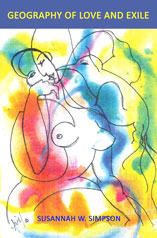 Geography of Love and Exile by Susannah Simpson
Geography of Love and Exile by Susannah Simpson
Červená Barva Press, 2016-
Susannah spent much of her childhood in Kabul, Afghanistan and spoke Farsi as a child. She has been a waitress, a founding member of the Ad Hoc Players, learned to wield a grease gun at at an auto repair garage, worked on locked psychiatric wards and as a Hospice nurse held the hands of the dying. She is the Expressive Writing Specialist at a residential treatment center in West Palm Beach,FL.
In Geography of Love and Exile, Susannah Simpson explores the deepest of human desires: to belong to this world. Through language translucent with longing, she introduces us to her many worlds. We walk with her through the bazaars of Kabul, experience the sensual pleasure of s'mores over a campfire in upstate New York, witness the red-shouldered hawk's shadow "looping across canal water" in Florida. All the while, Simpson's inner landscape-of loss, loneliness, love-accompanies us along the way. To read this remarkable collection is to explore how the places in our lives shape who we are-and sometimes, if we are fortunate, help us to feel a little less alone.
-Mary Reynolds Thompson, author of Embrace Your Inner Wild and Reclaiming the Wild SoulI couldn't read Geography of Love and Exile without thinking of Zora Neale Hurston's line-"Ships at a distance have every man's wish aboard." Or, I would add, even ships at anchorage, ships moored to the quay, temporarily in port, poised to continue a voyage, contain our yearning, our restlessness, our hunger for both memory and renewal, for unchartered distance and unrelenting intimacy. This, then, is the spirit and the soul of Susannah Simpson's powerful work, each poem a vessel of a journey taken, lost, interrupted, unfinished, redeemed.
$17.00 | ISBN: 978-0-9981027-2-6 | 67 Pages | In Stock
-Bob Shaccochis, author of Swimming in the Volcano; The Immaculate Invasion; The Next New World; Domesticity, and The Woman Who Lost Her Soul
Noel Sloboda
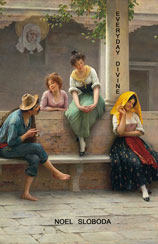 Everyday Divine by Noel Sloboda
Everyday Divine by Noel Sloboda
Červená Barva Press, 2021-
Noel Sloboda earned his Ph.D. from Washington University in St. Louis. His dissertation about Edith Wharton and Gertrude Stein became a book. He sat on the board of directors for the Gamut Theatre Group for a decade, while serving as dramaturg for its nationally recognized Shakespeare company. Sloboda has published two poetry collections, six chapbooks, and hundreds of poems in journals and magazines. He is currently an Associate Professor of English at Penn State York.
In Everyday Divine, Noel Sloboda presents a sequence of poems about saints. These figures stand with one foot in the realm of the secular, the other in the realm of the sacred. At the same time, Sloboda pushes hagiography outside of familiar contexts, revealing myriad new saints out there just waiting to be discovered. Readers of Everyday Divine will catch "The Patron Saint of Shoplifters" filching a candy bar, listen to rumors spread by “The Patron Saint of Gossip,” and find themselves stuck in traffic behind "The Patron Saint of Rubberneckers." In some of Sloboda's saints, readers will also identify parts of themselves, thereby glimpsing connections to others.
I've been a fan of Noel Sloboda's work for about ten years. Everyday Divine is a series of "patron saints," portraits of everyday people told with insight and gentle humor. Sloboda serves up fresh text with lively, palpable metaphors. The result is enjoyable, very readable poetry.
-John Philip Johnson, Pushcart Prize-winning poet, author of The Book of FlyThrough everyday characters, Noel Sloboda's Everyday Divine makes the reader reconsider what he or she takes for granted. Whether it be a character reevaluating his anxieties, a shoplifter stealing out of need and transforming the act into performance art, or because of line breaks like "Always says never imagine // this will not happen / again," the reader's expectations are upended. Like all good art, these poems challenge the reader’s everyday habits of perception for the better.
$8.00 | ISBN: 978-1-950063-06-2 | 30 Pages
-Tom Holmes, editor of Redactions: Poetry & Poetics
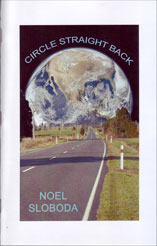 Circle Straight Back by Noel Sloboda
Circle Straight Back by Noel Sloboda
Červená Barva Press, 2012-
Originally from Massachusetts, Noel Sloboda lived in Missouri while earning his Ph.D. from Washington University. He currently serves as dramaturg for the Harrisburg Shakespeare Company and teaches at Penn State York. The author of the poetry collection Shell Games (sunnyoutside, 2008), he has also published several chapbooks. Learn more here: http://www2.yk.psu.edu/sites/njs16/
“In that ghostly area between flash fiction and prose poems, you’ll find the work of Noel Sloboda. At his best, his dry humor and easy way with a sentence propel you forward from each piece into the next. Not only will Sloboda show you where you’ve been in the world, he’ll let you know a bit about the future, too. His characters, ‘hungry for redemption,’ are the real achievement in this kind of short work. Solidly real, honest and forthright, they’ll stick with you like early childhood memories recalled by chance in the day-to-day struggle of living.”
—Rusty Barnes
Of Species
A tyrannosaurus and a triceratops put their heads together and guessed what would inevitably happen to all the dinosaurs, but the two could not agree how the end would come about.
It will surely be a flood, boomed the tyrannosaurus.
I rather suspect meteors will rain down, countered the triceratops in a loud contralto.
They debated for some time, before finally agreeing to disagree, since preventative measures—they decided—were more important, ultimately, than causes. United, they resolved to construct a massive canoe with a great umbrella mounted in its middle. They called their craft The Salvation, and as soon as it was seaworthy, they eagerly launched. In their haste, they forgot to bring paddles, and so the tyrannosaurus and triceratops drifted into the deeps, then drifted and drifted some more.
“It seems,” said the triceratops with an ironic smirk, “we’ve designed our own undoing. Surely, we’ll both starve out here.”
“One of us won’t,” said the tyrannosaurus, a gleam in one of his yellow eyes, which had a center shaped like a sharp tooth.
When he had finished his meal, the tyrannosaurs sighed heavily, regretting that his arms were too little to wipe his chops. Then he took down the umbrella and waited for the meteors.
Reviews
Flash Fiction Chronicles:
$7.00 | 34 Pages | In Stock
http://www.everydayfiction.com/flashfictionblog/book-review-circle-straight-back-by-noel-sloboda/
Judith Skillman
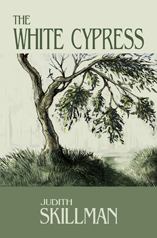 The White Cypress by Judith Skillman
The White Cypress by Judith Skillman
Červená Barva Press, 2011-
Judith Skillman is the author of thirteen full-length books of poetry. Her collection, Heat Lightning: New and Selected Poems 1986 – 2006 was published by Silverfish Review Press. She is the recipient of an award from the Academy of American Poets for Storm, Blue Begonia Press, 1998. She has also received grants from King County Arts Commission and Washington State Arts Commission.
Judith Skillman’s new collection, The White Cypress, is a finely textured weave that astutely examines the “seven deadly sins” from varying points-of-view. Certainty is erased as the reader is immersed in a mercurial blend of myth and personal history. Though we learn that “stunting” can be caused by denial, there is also a “violence in pleasure and leisure” as subtext. Each cherub embodies a nymph, the exotic the familiar. Using crafty fluctuation, these poems dislocate the reader so that firm ground is not an option. Skillman’s world is strangely fluid, yet layered with complexities that complement one moment and subtly contradict the next. The White Cypress asks us to ponder the residual problems of naming (our) “sins.”
—Katherine Soniat, author of The Swing GirlJudith Skillman’s poems are finely hewn, well-balanced, and compelling. Whatever her subject matter—ants, a lemon, September, a harbor, a plum tree—her pieces unfurl, progress, and culminate seamlessly; narratives, portraiture, and commentaries infused with palpable images, lines destined for epigraphy. This is poetry worth reading and rereading.
—John Amen, author of At the Threshold of Alchemy, editor of The Pedestal MagazineSkillman’s poem embrace matter rather than meaning, and all manner of matter—from the Hellenic to the Hebrew, from the heroic to the quotidian. All are pumped and stitched into the skillful skein of Skillman’s work.
—Meredith Davies Hathaway, Poetry InternationalAs one privileged to hold a front-row seat to the blossoming of Judith Skillman as an award-winning poet, I am always happy to treat myself to more of the apt language that she uses to illuminate the intricacies of human relationships. I saw the flowering of this talent, and am happy to add my voice as witness to its craft and its power.
—Jesse Glass, author of The Passion of Phineas Gage & Selected Poems, Professor, Meikei University, Tokyo, editor of Ahadada Press
Raven Chronicles:
http://ravenchronicles.org/Reviews/17-Daley-Skillman.htmlThe White Cypress is reviewed in The Boston Area Small Press and Poetry Scene
$15.00 | ISBN: 978-0-9831041-2-4 | 67 Pages | In Stock
Scroll down to: June 28, 2011
http://dougholder.blogspot.com/
Paul Sohar
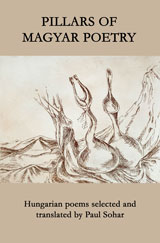 PILLARS OF MAGYAR POETRY Hungarian poems selected and translated by Paul Sohar
PILLARS OF MAGYAR POETRY Hungarian poems selected and translated by Paul Sohar
Červená Barva Press, 2024-
Paul Sohar (born 1936, in Hungary) found his way as a 1956 refugee to the United States where he continued his studies in philosophy and chemistry. The latter subject secured for him a day job in a research lab, but at night he immersed himself in literature. After early retirement on disability, his sporadic publications grew to an avalanche of poetry, prose, and translations. His own poetry has appeared in three books, one of them a prize winner Wayward Orchard (Wordrunner Press, 2011), and the latest being In Sun's Shadow (Ragged Sky Press, 2020). His nineteen volumes of translations have earned him four prizes, most recently the Balassi Literary Translation Grand Prize (2021, Budapest, Hungary). His writings and translations have appeared in hundreds of periodicals such as Agni, Kenyon Review, Rhino, Writers Journal, and others.
This brief anthology covers six centuries and contains some of the most popular Hungarian poems in addition to many of the translator's favorites.
Cover art: Jan Ten Broeke (1930-2019)
$21.95 | ISBN: 978-1-950063-86-4 | 171 Pages
Andrew Stancek
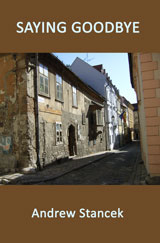 SAYING GOODBYE by Andrew Stancek
SAYING GOODBYE by Andrew Stancek
(Flash-Fiction) Červená Barva Press, 2023-
Brief Description of Saying Goodbye
A year in the life of a six-year-old Slovak boy being brought up by his grandparents in Soviet-era Czechoslovakia. In this flash story of childhood and self-discovery, filled with heartbreak and joy, betrayal and love, Adam must invent who he will become.Andrew Stancek describes his vocation as dreaming - clutching onto hope, even in turbulent times. He has been published widely, in SmokeLong Quarterly, FRIGG, Hobart, Green Mountains Review, New World Writing, New Flash Fiction Review, Jellyfish Review, Peacock Journal and The Phare, among others. Among his contest wins are the London Independent Story Prize, the Reflex Fiction contest, and the New Rivers Press American Fiction contest. His work has appeared in Best Microfiction 2021, the Bending Genres Anthology and Bath Flash Fiction anthologies. He has been nominated for the Pushcart Prize.
Saying Goodbye is the story of a family reckoning with loss, loyalty, disappointment, devotion, and at the center our narrator, a child as unforgettable as any Dickens hero. Abandoned by his mother, rescued by tenderness, he loses his innocence and finds his courage in a world both unapologetic and lit with the fiercest sort of love. This gorgeous story will break your heart open.
-Nancy Stohlman, After the Rapture and Going Short: An Invitation to Flash FictionSome boys get a layer cake, others get abandonment. When young Adam's unstable mother drops him off at his grandparents' Bratislava home prior to his sixth birthday, he knows she is not coming back. Instead he must stitch together a new life, of neighborhood bicycle rides, local shopkeepers, warm strudel smells, and fresh family pain. Andrew Stancek's Saying Goodbye is at once a story of longing and grief, and one of resiliency and tender connection between a grandfather and a boy. "Something good always grows out of something awful, like mushrooms out of manure," Adam says. This is a spare, effective novella-in-flash of one year in a boy's life, beautifully written, memorably told.
$16.00 | ISBN: 978-1-950063-75-8 | 52 Pages
-Sara Lippmann, author of Doll Palace
John L. Stanizzi
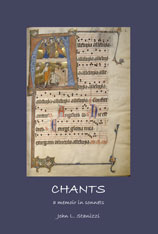 CHANTS a memoir in sonnets by John L. Stanizzi
CHANTS a memoir in sonnets by John L. Stanizzi
Červená Barva Press, 2019-
John L. Stanizzi is author of the collections – Ecstasy Among Ghosts, Sleepwalking, Dance Against the Wall, After the Bell, Hallelujah Time!, High Tide - Ebb Tide, and Chants. His poems have appeared in Prairie Schooner, American Life in Poetry, The New York Quarterly, Paterson Literary Review, The Cortland Review, Rattle, Tar River Poetry, Rust & Moth, Connecticut River Review, Hawk & Handsaw, and many others. His work has been translated into Italian and appeared in El Ghibli, in the Journal of Italian Translations Bonafinni, and Poetarium Silva. His translator is Angela D'Ambra. John has read and venues all over New England, including the Mystic Arts Café, the Sunken Garden Poetry Festival, Hartford Stage, and many others. John is coordinator of the Fresh Voices Poetry Competition for Young Poets at Hill-Stead Museum, Farmington, CT. He is also a teaching artist for the national recitation contest, Poetry Out Loud. A former New England Poet of the Year, John teaches literature at Manchester Community College in Manchester, CT and he lives with his wife, Carol, in Coventry.
This is what history sounds like, a song that takes over us until we join the Chants and become part of history. Thanks to John L. Stanizzi for showing us another path of walking into today.
—Romeo Oriogun, Nigeria's Oriogun is the recipient of the Brunel International African Poetry Prize 2017These loose sonnets with the punning title — "Chants"—push us in various directions: towards the past, towards the present, even towards the immensely problematical future. It's the story of a Catholic boy grown into a compassionate, intelligent man looking at the world as it has configured itself in his lifetime: all the changes. The difference from a newspaper account is that Stanizzi is an observer with music on his mind: "cause / to breathe in cleanly in the thrall of rain." These poems sing—"chants"—about the life he has lived out of all the lives he might have lived: "chance." It is a poetry of witness dealing with death, life, childhood and growth. But it also allows us to experience sudden miracles of flight: I am inspired/to pick him [a goldfinch] up—and he lets me!—his eyes/unsure and trusting in a lightning flash,/and then he flies, my upturned palm in rain.
—Jack Foley, Foley is the author of many books, including Grief Songs, and The TigerThese inspiriting poems amplify and celebrate life. They find the deepest reaches of the human heart with a passion that will cause readers to pause and read again. From the beauty of goldfinches to the horrors of war and the joys and tribulations of family life, John Stanizzi discovers the universal in the personal. He turns words into instruments that pierce the soul.
$17.00 | ISBN:978-1-950063-00-0 | 47 Pages
—David K. Leff, author of The Breach and Poet-in-Residence New England National Scenic Trail, 2016-2017
Michael Todd Steffen
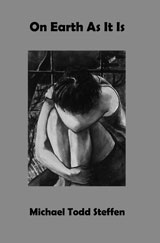 On Earth As It Is by Michael Todd Steffen
On Earth As It Is by Michael Todd Steffen
Červená Barva Press, 2022Of his first book Partner, Orchard, Day Moon published in 2014 David Ferry wrote, Michael Steffen is so alive in his writing, keen with observation, both of what things actually look like, what the wind feels like, how things grow and rot, and also of character, his own, his uncles', anybody's he sees. Steffen is the recipient of a 2021 Massachusetts Cultural Council Literary Fellowship, and his poetry has appeared in journals, including The Boston Globe, The Concord Saunterer, Ibbetson Street, The Lyric and Synchronized Chaos.
From beginning to end, through great and small, the stirrings of a hurricane, the agility of a housefly, the majesty of a Pacific Northwest Sequoia, On Earth As It Is upholds the wonders of life on our lonely blue planet, bringing new inflections to the voice of eco-poetry, while formal and topical surprise from poem to poem defies genre. Steffen's restless curiosity ranges from silent alarm to staggering resignation, formal irony for the popular and political language of "global warming" to out and out observance for the iconic heroes and defenders of the earth and its elements from Rachel Carson to Ansel Adams. Still, barber, dentist, the memory of a dog, a Botticelli Madonna and Infant, Mae West, a tortoise wavering between its natural appearance and its resonance in fable, also appear as subjects in the poems to evoke the human and mythical entanglements at stake in the survival of our world. Shy of the overwhelming challenges we are facing in this realm today, the simple challenge of this selection to the reader is how to stop turning its pages.
It is so present, the speaker in this collection observes, and every poem in some way proves this: Steffen's close observations, intimate portraits, sense of history, surprising wit and the play of dark and light, all bring the reader into the now, a world where the sheer physicality of abstractions (the vice of innocence, immensity I sleep on, a narrow salvation and many more) renews and refreshes their meaning. The pleasures of the poems in On Earth As It Is are many, but foremost among them is the striking combination of the clear-eyed and the complicated, the everyday and the transcendent. This is accomplished and important work.
-Joan Houlihan, author of It Isn't a Ghost if It Lives in Your ChestCover art: Bridget Galway
$16.00 | ISBN: 978-1-950063-17-8 | 53 Pages
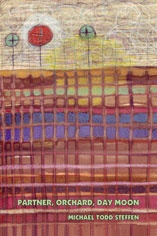 Partner, Orchard, Day Moon by Michael Todd Steffen
Partner, Orchard, Day Moon by Michael Todd Steffen
Červená Barva Press, 2014-
Cover Art: Irene Koronas
Michael Todd Steffen’s poems and articles have appeared in Connecticut Review, Poem (HLA), ACM (Another Chicago Magazine), Ibbetson Street, Wilderness House Literary Review, Muddy River Poetry Review and in the window of the Grolier Poetry Bookshop. A graduate of Belmont in Nashville, on a Rotary International Fellowship he studied and taught in England and France. He was awarded the 2007 Somerville Newswriters Festival poetry prize, and currently lives in Cambridge where he writes and works for non-profits.
I've just come back from reading the poems in Partner, Orchard, Day Moon, full of admiration. Steffen is so alive in his writing, keen with observation, both of what things actually look like, what the wind feels like, how things grow and rot, and also of character, his own, his uncles', anybody's he sees. The book gives us many wonderfully memorable lines using his chosen meter for all its worth. This is very good work.
—David Ferry"A very moving collection of poems. I’m enjoying reading — and re-reading—the poems."
—Kathleen Spivack, author of With Robert Lowell and His Circle: Sylvia Plath, Anne Sexton, Elizabeth Bishop, Stanley Kunitz and Others
Reviews:
Poet to Poet: Michael Todd Steffen, author of Partner, Orchard, Day Moon (Cervena Barva Press, 2014) interviewed by Doug Holder on SCAT TV.
http://vp.telvue.com/preview?id=T02351&video=195415March, 17, 2014; Boston Area Small Press & Poetry Scene:
$17.00 | ISBN: 978-0-9883713-2-3 | 61 Pages | In Stock
http://dougholder.blogspot.com/2014/03/partner-orchard-day-moon-by-michael.html
Tim Suermondt
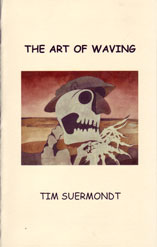 The Art of Waving by Tim Suermondt
The Art of Waving by Tim Suermondt
Červená Barva Press, 2014-
Tim Suermondt is the author of two full-length collections: TRYING TO HELP THE ELEPHANT MAN DANCE (The Backwaters Press, 2007) and JUST BEAUTIFUL from New York Quarterly Books, 2010. He has published poems in Poetry, The Georgia Review, Blackbird, Able Muse, Prairie Schooner, PANK, Bellevue Literary Review and Stand Magazine (U.K.) and has poems forthcoming in Gargoyle, A Narrow Fellow and Plume Poetry Journal among others. After many years in Queens and Brooklyn, he has moved to Cambridge with his wife, the poet Pui Ying Wong.
"Tim Suermondt's poems in this new collection are open, friendly and inviting, in "the voice of our familiarity," but always with a profound or humorous twist. He is devoted "to a bravery found only in the details," to the "the raspberries and the ball games," or his wife "in a strange and beautiful hat," as well as to the dreams, disappointments and possibilities of everyday existence. Not for him the modish pessimism and linguistic difficulties of much of contemporary poetry. "When my wife puts on some Schubert," he says, "I'm sure the world will never end/ and neither will we." Here is a poet who communicates directly and has some hope for us. The apparent simplicity and genial humor of these marvelous poems are grounded in an artful subtlety that reflects the way life really is."
—Norman StockCover Art: "Skull in a Landscape" (1946) by Edward Burra
$7.00 | 28 Pages | In Stock
Vijaya Sundaram
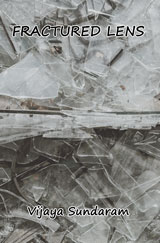 FRACTURED LENS by Vijaya Sundaram
FRACTURED LENS by Vijaya Sundaram
Červená Barva Press, 2023Vijaya Sundaram is the Poet Laureate of Medford, Massachusetts (2023-2025). Originally from India, Vijaya Sundaram is a poet, musician, singer-songwriter, and educator. Her work has appeared in the Rising Phoenix Press, the Stardust Review, and TELL Magazine. This is her first collection of poems in print. She lives in Medford, Massachusetts with her husband, daughter, and Holly, their standard poodle.
$16.00 | ISBN: 978-1-950063-66-6 | 52 Pages
Roberta Swann
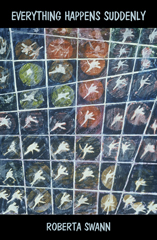 Everything Happens Suddenly by Roberta Swann
Everything Happens Suddenly by Roberta Swann
Červená Barva Press, 2010-
Roberta Swann was program director of the Great Hall at Cooper Union and co-founder of the American Jazz Orchestra. Her poetry and fiction appear in many literary journals. She has taught at the Cooper Union, Indiana University, The New School, Baruch College and the Bennington Writing Workshops.
“Roberta Swann’s poems have a welcome vivacity; they are deft and full of charm and humor. But not entirely. Many of the poems record appealing moments of the natural world and yet sometimes, as she writes, ‘Abandonment is Nature’s way.’ In a poem that begins with recognition of the failing state of her mother, the last stanza begins ‘A bear is at the bird-feeder.’ It is this mixture of light and dark–the embrace of all of it–that is her special gift. Much pleasure lies within the pages of her book.”
—MARY OLIVER“What’s the secret to Roberta Swann’s funny, inventive and moving poems about the natural world? I think it’s her voice, full of humorous aplomb and unflinching honesty. She knows how to balance sadness with happiness. Just as she moves back and forth from city to country, she can also gracefully cross the dangerous bridge between despair–at a beloved mother’s decline–and joy–at the antics of a big brown bear or a grizzled old squirrel. She’s able to see herself inside of nature, not outside. ‘You'll be stardust. I will too’.”
$15.00 | ISBN: 978-0-9844732-4-3 | 72 Pages | In Stock
—MAURA STANTON
Home | Červená Barva Press Books | Poetry Chapbooks | Poetry Books | Anthologies | Fiction | Flash Fiction | Literary Journals | Non-fiction | Plays | Memoirs | Used Books | Audio CD's
